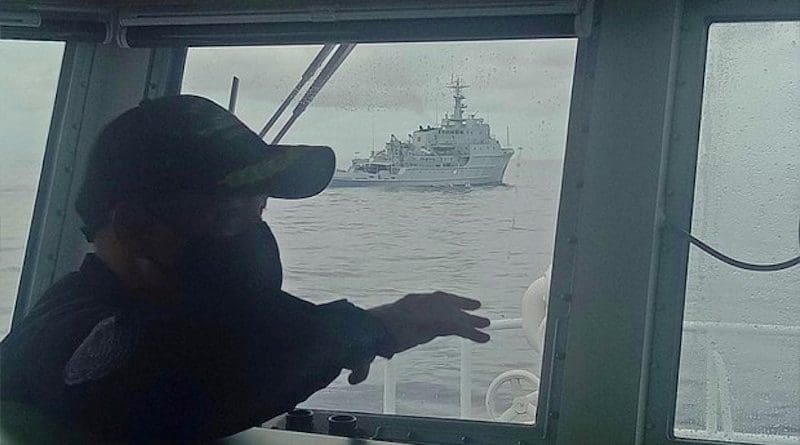Stop Harassing Philippine Coast Guard Boats, Washington Tells Beijing
By BenarNews
Washington called on Beijing on Saturday to stop “harassment and intimidation” of Philippine ships, after the Philippine Coast Guard reported a near-collision with Chinese vessels carrying out “dangerous maneuvers” in the South China Sea.
U.S. reaction to the April 23 incident – which China blamed on Philippine vessels – came two days before President Joe Biden was due to host his Philippine counterpart, Ferdinand Marcos Jr., at the White House.
“Imagery and video recently published in the media is a stark reminder of PRC harassment and intimidation of Philippine vessels as they undertake routine patrols within their exclusive economic zone,” said a statement attributed to U.S. State Department spokesman Matthew Miller.
“We call upon Beijing to desist from its provocative and unsafe conduct. The United States continues to track and monitor these interactions closely,” he said.
He reiterated that the United States will defend the Philippines in case of any armed attack on its military, public vessels or aircraft, under the 1951 U.S. Philippines Mutual Defense Treaty.
On April 23, two China Coast Guard (CCG) vessels intercepted Philippine patrol boats and “exhibited aggressive tactics” near Second Thomas Shoal, locally known as Ayungin Shoal, the Philippine Coast Guard (PCG) said on Friday.
At one point, CCG 5201 came within 50 yards (46 meters) of a Philippine ship, it said.
“This close proximity posed a significant threat to the safety and security of the Philippine vessel and its crew,” coast guard spokesman Commodore Jay Tarirela said.
He added that a China Coast Guard ship “persistently followed BRP Malabrigo” at a distance of 700 yards (640 meters).
The Philippines had deployed two 44-meter vessels to carry out a week-long maritime patrol in the West Philippine Sea, part of the contested South China Sea within Manila’s exclusive economic zone. A small group of Filipino journalists was on board.
At a press briefing in Beijing on Friday, Chinese Foreign Ministry spokeswoman Mao Ning said that the Philippine Coast Guard vessels had trespassed into waters near Ren’ai Reef, the Chinese name for Ayungin Shoal, and had dangerously approached a Chinese vessel.
“[T]he Chinese Coast Guard vessel upheld China’s territorial sovereignty and maritime order by making timely maneuvers to dodge the dangerously approaching Philippine vessel and avoid a collision. The Chinese side’s maneuvers were professional and restrained,” she said.
The Philippines had carried out “premeditated provocation” with journalists on board to “deliberately create a friction, and be blamed on China and hyped up in the media,” she said. “China strongly protests and deplores this.”
Beijing and Manila, as well as other Southeast Asian countries and Taiwan, have overlapping claims in the South China Sea. In 2016, an international tribunal ruled in favor of the Philippines and against the sweeping “nine-dash line” by which Beijing asserts its maritime claims in the strategic waterway, but China has refused to acknowledge the ruling.
On Monday, Biden is expected to “reaffirm the United States’ ironclad commitment to the defense of the Philippines, and the leaders will discuss efforts to strengthen the longstanding U.S.-Philippines alliance,” White House Press Secretary Karine Jean-Pierre said in a statement earlier this month.
“The two leaders will also discuss regional matters and coordinate on efforts to uphold international law and promote a free and open Indo-Pacific.”
Marcos is scheduled to travel to Washington on April 30, and return home on May 4, said the Philippine presidential communications office.
The visit will “substantively progress efforts to further deepen relations and political ties, to bring about lasting socio-economic partnerships, as well as to enhance defense and security cooperation,” the office said in a news release.

